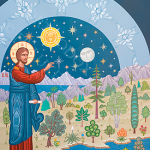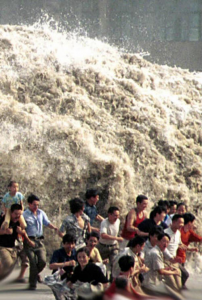
Deprecated: trim(): Passing null to parameter #1 ($string) of type string is deprecated in /home/aoiusa/public_html/wp-content/plugins/sexybookmarks/public.php on line 388
Deprecated: trim(): Passing null to parameter #1 ($string) of type string is deprecated in /home/aoiusa/public_html/wp-content/plugins/sexybookmarks/public.php on line 394
Deprecated: trim(): Passing null to parameter #1 ($string) of type string is deprecated in /home/aoiusa/public_html/wp-content/plugins/sexybookmarks/public.php on line 400
 This essay below that Fr. David Hudson sent along is timely. I have a small parish now which means that after the Divine Liturgy we always have a discussion about any topic that people want to talk about. Today we had the question: How do we make sense of the tsunami in Japan? It wasn’t the sermon and after the necessary caveats (“I am a priest, not a theologian,” “this is my opinion” and so forth) I laid out how I saw it.
This essay below that Fr. David Hudson sent along is timely. I have a small parish now which means that after the Divine Liturgy we always have a discussion about any topic that people want to talk about. Today we had the question: How do we make sense of the tsunami in Japan? It wasn’t the sermon and after the necessary caveats (“I am a priest, not a theologian,” “this is my opinion” and so forth) I laid out how I saw it.
I began with St. Paul in Romans,
For I consider that the sufferings of this present time are not worthy to be compared with the glory which shall be revealed in us. For the earnest expectation of the creation eagerly waits for the revealing of the sons of God. For the creation was subjected to futility, not willingly, but because of Him who subjected it in hope; because the creation itself also will be delivered from the bondage of corruption into the glorious liberty of the children of God. For we know that the whole creation groans and labors with birth pangs together until now.
If the creation that is subject to bondage, that is, if the entire creation experiences the corruption that entered the world when Adam fell, and awaits a freedom that will occur when mankind returns to God, then isn’t the opposite true as well? Won’t mankind’s descent from God subject the creation to greater corruption and disorder? There is a relationship between man and the rest of creation, some mysterious (hard to know) interrelationship woven into the very fabric of God’s creation where mankind’s faithfulness or unfaithfulness to God affects everything.
I used AID’s as an example. Is AID’s a punishment from God? No, I don’t think it is. Is there a relationship between AID’s and behavior? Does creation itself contain a mechanism of sorts where moral probity and sobriety have a salutary effect on even the materiality of our bodies, or dissipation a destructive effect? Is virtue and vice related to the harmony and disharmony of nature? Yes, I think it is. The scriptures certainly indicate such, particularly the Proverbs.
 If correct, you could say that these events may indeed be a judgment from God but that is a conclusion I am reluctant to draw because most people don’t see any relationship at all between virtue and creation. Or, if they do, they see it in juridical terms, that is, the tsunamis and so forth are sign of God’s unquenchable wrath. We sin, Zeus sends down lightening. The nature of the creation in other words, particularly it’s relationship to man and God, doesn’t factor into the reasoning at all. God isn’t Poseidon churning up the oceans because He is angry, but if we are not careful that is exactly how many people (including many Orthodox given their inculcation of the precepts of popular Christianity) will perceive these words to mean.
If correct, you could say that these events may indeed be a judgment from God but that is a conclusion I am reluctant to draw because most people don’t see any relationship at all between virtue and creation. Or, if they do, they see it in juridical terms, that is, the tsunamis and so forth are sign of God’s unquenchable wrath. We sin, Zeus sends down lightening. The nature of the creation in other words, particularly it’s relationship to man and God, doesn’t factor into the reasoning at all. God isn’t Poseidon churning up the oceans because He is angry, but if we are not careful that is exactly how many people (including many Orthodox given their inculcation of the precepts of popular Christianity) will perceive these words to mean.
One further point although one I did not make this morning: This is a far cry from the nature as goddess ideology that informs (and organizes) much of the thinking of the environmental movement. There the creation is a kind of mysterious force, irrational, something be feared, perhaps even worshiped. When you see nature personified, when the impersonal forces are personalized, when the destructive forces of nature are posited as the Judge, when nature rather than God is revered, watch out. That approach lingers at the edges of neo-paganism.
The essay follows.

Metropolitan Teofan of Moldova and Bucovina
The earth is broken up, the earth is split asunder, the earth is violently shaken (Is 24:19).
The earth has been shaken again to its core in the Land of the Rising Sun, and has behaved violently, resulting in despair for humanity. Millions of victims of the earthquakes and overflowing waters in Asia, of the hurricanes in America, of the spread of AIDS in Africa, the floods in Romania and all Europe in recent years, and now of the merciless earthquake in Japan forces us to reflect on the causes of these disasters. What has happened, really, in the depths of the earth, on the earth, in the waters and in the atmosphere? Who is responsible for all these things?
We believe and we declare that man, assigned by God to be “priest” and servant of creation, is responsible, through his deeds, for everything that happens in nature.
Nature is the friend of man, not his enemy. However, when he seeks only his own interests, man upsets the balance established by the Creator in the environment. The consequence of this attitude lacking in peaceful and respectful communication with nature is its transformation from friend and ally to enemy. “Here in the Balkans,” said St. Nikolai Velirimovich, “something of the ancient respect for nature is still preserved. We still see the custom where the peasant makes the sign of the Cross and says ‘Lord, forgive’ when he wants to chop down a tree, mow hay, or slaughter an animal. The peoples who have declared war on nature… have brought numberless evils on themselves. The person who severs friendly relations with nature, severs them at the same time with God.”
The exploitation of nature by modern technological society is, in general, recognized as responsible for some natural disasters. What is not realized sufficiently, however, is the truth that everything which takes place in nature is an extension of what is happening in the heart of man. An attentive and responsible analysis of the history of mankind reveals the fact that holiness or sin in man affects the entire creation, influencing it for good or evil.
When man lives a clean lifestyle it brings joy and pours out blessings on the universe. When man fills his life with God, the creation in its totality is enlightened and serves man without any reservations. This is the explanation of the fact that the tree branches bend toward a saint when he passes by, and why poisons become harmless for a person with a holy life (Luke 10:19), and why animals cease to be wild in the presence of a person who has achieved inner peace. This truth, transposed to the level of an entire people or of human society in general, directly results in nature manifesting itself in a peaceful way, without convulsions.
In contrast, when sinfulness becomes widespread it extends evil into the heart of creation and this comes back on mankind, in consequence, in the form of earthquakes, floods, diseases, drought, etc. Just as nature is receptive to goodness, modesty, faithfulness and spiritual beauty in man, it is also not impassive in the face of the evil, vanity, and the luciferic claims of superiority manifested by human beings. Neither storms nor deadly lightening, nor clouds of locusts, nor merciless floods take place randomly. They are the extension of the storms, the agitation, the spiritual drought, the unbelief, and the earthquakes which take place in the souls of people and among and between people. “The earth dries up and withers,” the Prophet Isaiah warns the sinful people [of Israel], “the world languishes and withers… the earth is defiled by its people; they have disobeyed the laws, violated the statutes and broken the everlasting covenant. Therefore a curse consumes the earth; its people must bear their guilt” (Is 24:4-6). “The earth is broken up, the earth is split asunder, the earth is violently shaken… so heavy upon it is the guilt of its rebellion…” (Is. 24:19-20). Living in the spirit of this biblical conception, the peasants of the Romanian village of yesteryear used to seek to discover what great sin had been committed among themselves when some plague or other came upon their fields, their animals, or themselves.
Are not the disasters which have so powerfully shaken up our human life really a reflection, a reverberation in nature of the devastating evil within us? As a reaction to everything that has happened in the wake of the floods [in Europe], the decision has been made to construct higher and stronger walls and dams, to stop, in the future, the fury of the waters. These actions are welcome and absolutely necessary. Yet are they enough? Aren’t we really applying the same logic as the people after Noah’s floods? They decided to build the Tower of Babel. In our days, just as then, no one is talking about the need to raise inner walls to stave off the fury of hatred, of division, of the disintegration of the family, and implicitly of the nation. There is no talk, or maybe a little feeble talk—as though we are ashamed—about the raising up of educational and legislative walls to protect us from the soul-destroying and body-destroying fury of sins against nature, of abortion, of pornography.
The earthquake in Japan and other disasters caused by the elements of nature are also a warning to humanity to turn their faces back to God.
Through the Church, the world is offered the possibility of inner renewal through faith in the Incarnation, Death, and Resurrection of Christ. The earth, the waters, the atmosphere, wait “in eager anticipation”, in the words of St. Paul the Apostle, to be “liberated from [their] bondage to decay” and to our sins (Rom. 8:19-21).
We must receive Christ God into our souls, so that He might be born in us and save us. Otherwise, who knows what disasters we will suffer in the future?
Every tender smile directed to the stricken of this world, every attitude of forgiveness for the one who has wronged us, every comfort for a ravaged elderly person, every newborn child, every prayer for “those who love us and for those who hate us,” every experience of God’s presence in our lives is transformed into blessing for us, for others, and for the entire creation.